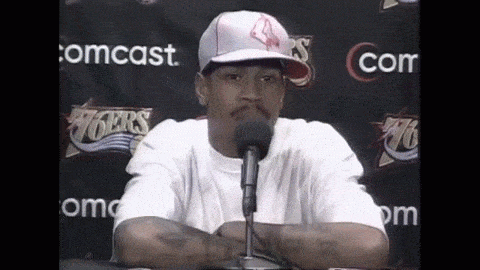
After years of sparring with the media, Allen Iverson has finally made peace with the people who for years have taken his words and broadcast them to the world, sometimes for better, sometimes for worse. In a video interview with The Huffington Post last week, the retired NBA superstar said that these days, he better understands why the media works the way it does, why reporters ask such probing questions and why journalists sometimes bypass ambiguity and complexity in favor of a more simplified story — one easily packaged with a salacious headline atop it. (function()var src_url=”https://spshared.5min.com/Scripts/PlayerSeed.js?playList=518834390&height=333&width=…
After years of sparring with the media, Allen Iverson has finally made peace with the people who for years have taken his words and broadcast them to the world, sometimes for better, sometimes for worse.
In a video interview with The Huffington Post last week, the retired NBA superstar said that these days, he better understands why the media works the way it does, why reporters ask such probing questions and why journalists sometimes bypass ambiguity and complexity in favor of a more simplified story — one easily packaged with a salacious headline atop it.
“Doing this for so long, I realize that the media — you have a boss. And your boss wants you to provide the best material that you can,” Iverson said. “And he might put pressure on you to do it a way that you feel is unconstitutional. You might not like it. But you still gotta feed your family. You gotta do what you gotta do. And I had to figure that out and I used to — I couldn’t stand the media, but I realized they have a job. They gotta do what they have to do.”
Iverson has sparred with the media throughout his playing career, and many journalists are guilty of taking Iverson, a complex and multilayered man, and turning him into a simplified caricature, a useful device to be written about for little more than his love of tattoos and his dislike of practice.
But while Iverson no longer despises the media, he does have one very simple wish for all the bloggers, reporters and analysts that write about people like him for a living: Treat the people you spend your lives covering like, well, people in your life, not characters in your story.
“I wish the media and people that work in media would realize sometimes — and I know it doesn’t pay your bills — but sometimes just sit back and think, like, ‘Man, what if this was my child? And somebody was doing this to them? And they had to go through it? If somebody bashed them like this?’” he said. “[Just] because their boss told them to do it. ‘What if this happened to my daughter, or my son? Or my mother? Or my father?’”

“Sometimes, I don’t think that they think that,” he continued. “I think it’s just ‘Be as harsh as you can if somebody tells you to.’ Instead of, ‘Okay, I’m going to write for how I feel in my heart.’ That’s the only thing. But I understand at the same time. I understand. Don’t nobody wanna talk about or hear about somebody donating money to a charity. You wanna hear about what Bin Laden is doing and what you think is on his mind.”
“That’s just the way life is. It’s just evil. Negativity sells,” Iverson concluded. “It’s just the world we live in. I mean, that’s it. Ain’t no need to try and sugarcoat it or anything like that. It just is what it is.”
It’s hard not to hear Iverson’s advice and not think of his infamous “practice” rant, in which the then Philadelphia 76ers star spewed the word no less than 14 times during a news conference. “Practice? We’re talking about practice?” he asked, in some form, over and over, to the delight of reporters.

But as shown in a new documentary on Showtime about the enigmatic star’s life, the full context of that rant has often been dropped from the story in favor of a soundbite that made Iverson look foolish and entitled. In reality, Iverson’s emotion was understandable. He had recently lost one of his best friends, and he had also lost an important game in the first round of the 2002 NBA playoffs, one year after taking his team to the finals.
“I’m upset for one reason, man. Cause I’m in here. I lost. I lost my best friend,” Iverson said during a portion of the press conference not often clipped and uploaded to YouTube. “I lost him. And I lost this year. Everything is going downhill for me.”
“My best friend dead. Dead,” he added later. “And we lost, and this what I got to go through for the rest of the summer, until the season starts over again.”
It doesn’t excuse everything he said, but it’s certainly important context. Context too often lost when the national media writes about the “rant.” Context that has been lost to history in favor of a more salacious, simplified headline. You can understand where Iverson is coming from. Or you should.

More from our sit-down interview with Iverson:
— Allen Iverson On Why He Respects NBA Coaches So Much
— This feed and its contents are the property of The Huffington Post, and use is subject to our terms. It may be used for personal consumption, but may not be distributed on a website.
Link to original –
Allen Iverson Has Some Thoughtful, Convincing Advice For Journalists




















